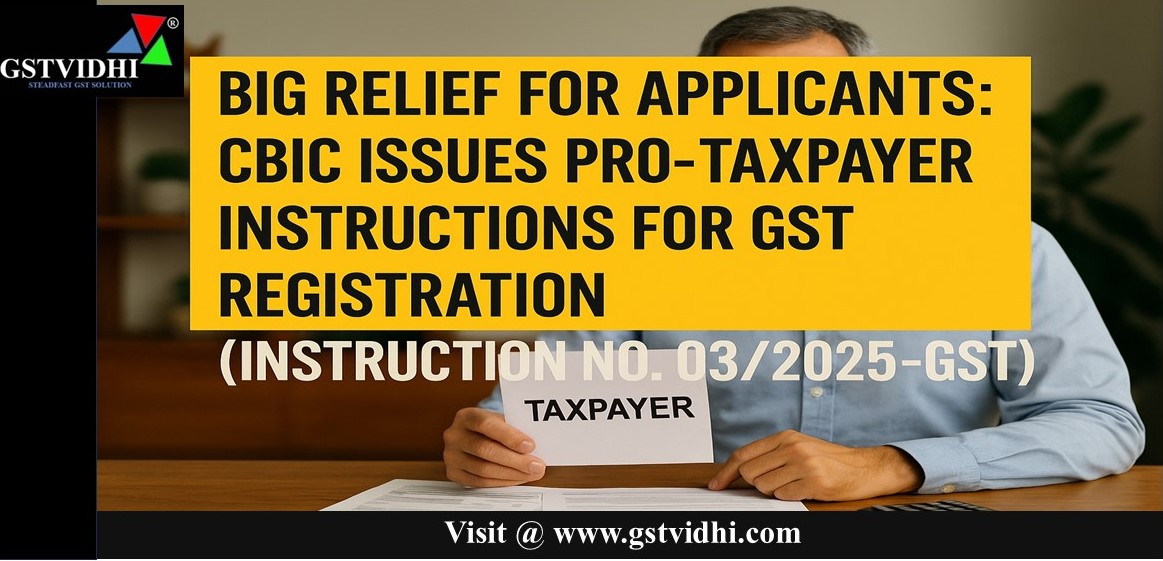
Big Relief for Applicants: CBIC Issues Pro-Taxpayer Instructions
for GST Registration (Instruction No. 03/2025-GST)
Date: 17th April 2025
Issued by: Central Board of Indirect Taxes and Customs (CBIC)
In a major relief to
genuine taxpayers, the CBIC has issued Instruction No. 03/2025-GST,
streamlining the process for GST registration and significantly curbing
arbitrary practices by tax officials. This new instruction replaces the earlier
Instruction No. 03/2023-GST and aims to strike a balance between preventing
fraudulent registrations and ensuring ease of doing business for
genuine applicants.
Why This Is
a Big Win for Applicants
For years, taxpayers have
faced harassment in the form of unnecessary clarifications, document
demands, and rejections while applying for GST registration. With this
instruction, CBIC has laid down clear and binding guidelines that:
- Limit the discretion of officers
- Standardize document requirements
- Mandate quick processing
- Penalize officers for unjustified
delays or rejections
Key
Highlights of the Instruction
1. Standardized
Document Requirements
- Officers can now only demand
documents listed in FORM GST REG-01.
- For owned premises, any one
document such as an electricity bill, water bill, or property tax
receipt will suffice.
- For rented premises, a rent
agreement and one ownership document of the lessor is enough.
- In shared or consent-based
premises, a consent letter, ID proof of the consenter, and one
ownership proof is sufficient.
- Affidavits
will be accepted in cases where rent agreements are not available,
provided electricity/water bills are in the applicant's name.
Strictly No More:
- PAN, Aadhaar, or photographs of the
lessor.
- Residential address-based
presumptions.
- Requests for unrelated licenses like
MSME/Trade License.
2. Presumptive
Queries Now Prohibited
Officers are barred from
raising queries based on:
- Residential address not matching the
business state.
- Business activities presumed
unsuitable for the premises.
- Prohibited/banned HSN codes.
Such queries often
delayed or denied genuine registrations and are now officially outlawed.
3. Timelines
and Clarity in Approval Process
- If not flagged as risky, registration
must be granted within 7 working days.
- If Aadhaar authentication is not done
or flagged as risky, physical verification must be completed within 30
days.
- Physical verification report must be
uploaded 5 days before the 30-day limit with
GPS-tagged photographs and supporting documents.
4. Strict
Limits on Raising Queries
Officers can raise
queries only:
- If documents are illegible or
incomplete.
- If address proof does not match the
application.
- With prior approval of a
Deputy/Assistant Commissioner for any non-listed document.
5. Accountability
of Tax Officials
- Zonal Chief Commissioners must
monitor applications regularly.
- Officers must not allow deemed
approvals due to inaction.
- Strict action
will be taken against officers violating these instructions.
Conclusion:
A Landmark Step Towards Fairness and Ease
The issuance of
Instruction No. 03/2025-GST is a landmark moment for GST applicants. It
restores fairness, ensures speedy disposal, and protects genuine
businesses from unjustified harassment.
This is not just a
procedural update—it is a strong message from the CBIC in favor of ease
of doing business, transparency, and administrative accountability.
Disclaimer: All
the Information is based on the notification, circular and order issued by the
Govt. authority and judgement delivered by the court or the authority
information is strictly for educational purposes and on the basis of our
best understanding of laws & not binding on anyone.
Find the Attachment (Press on Click Here )
Click here